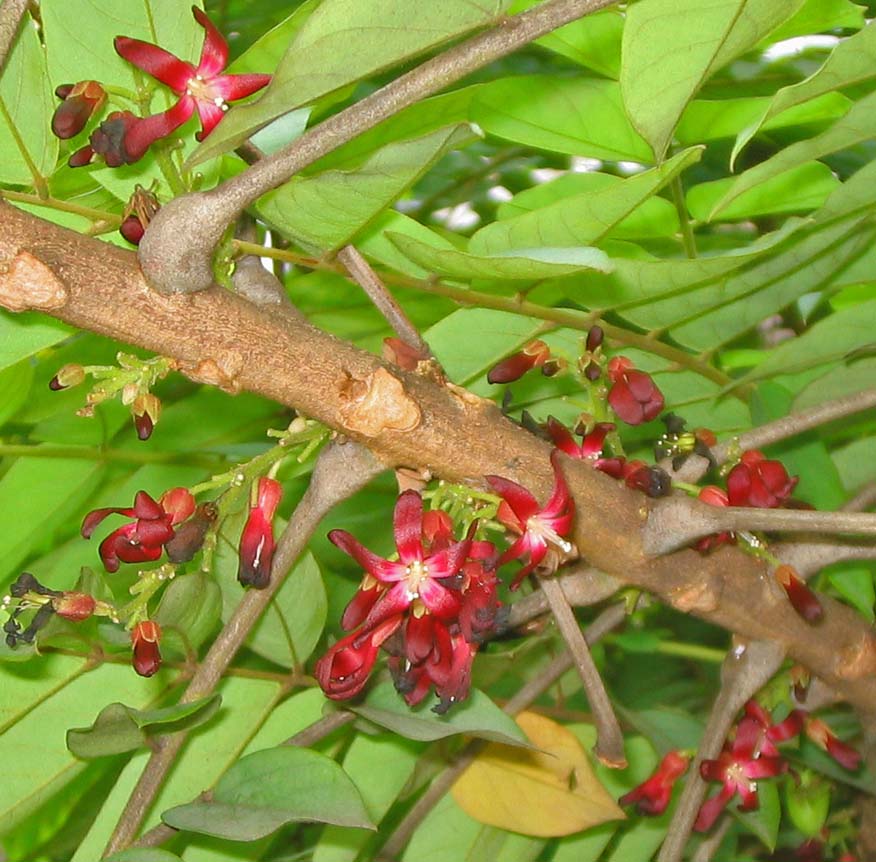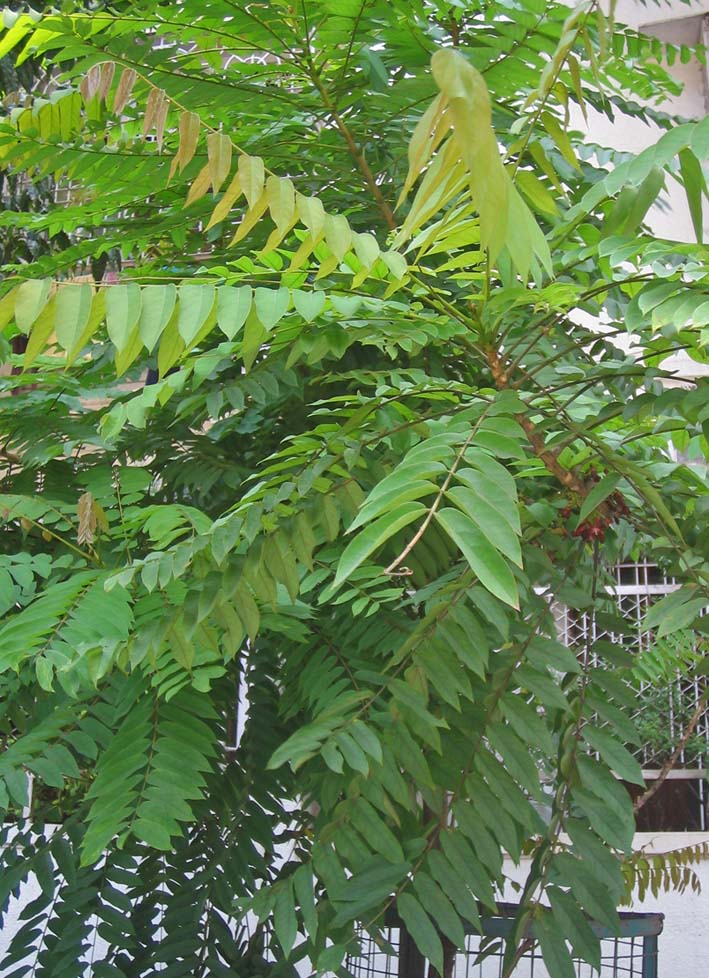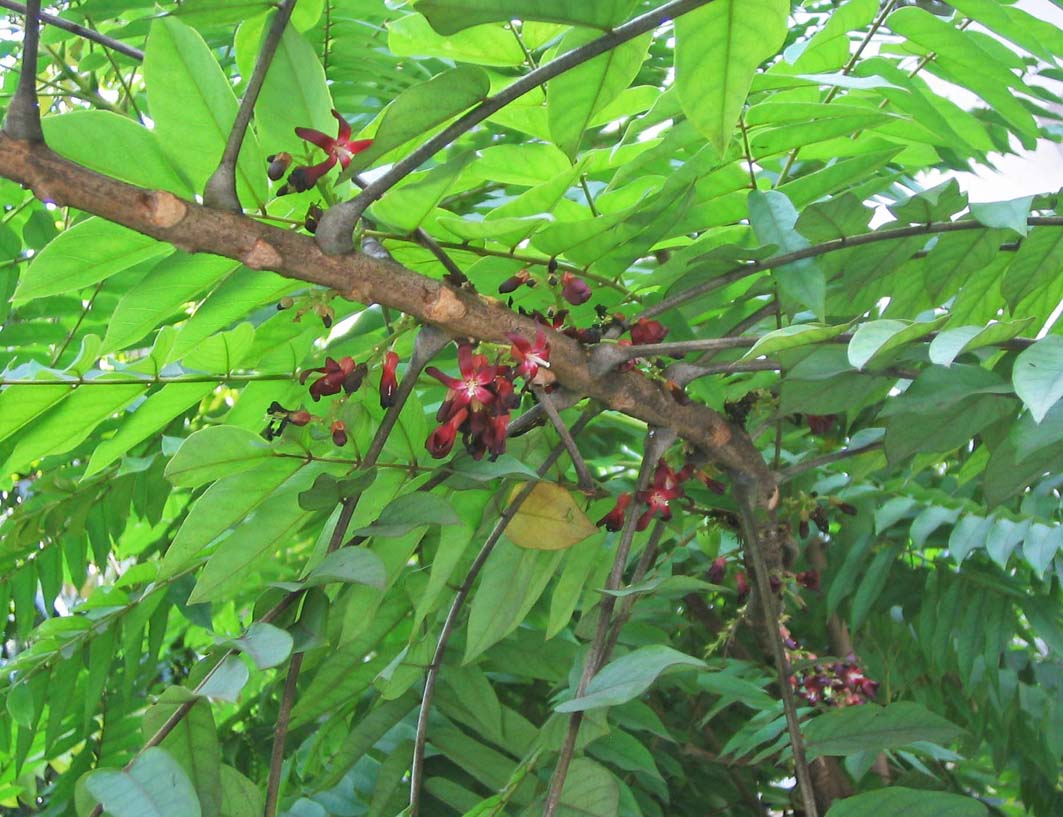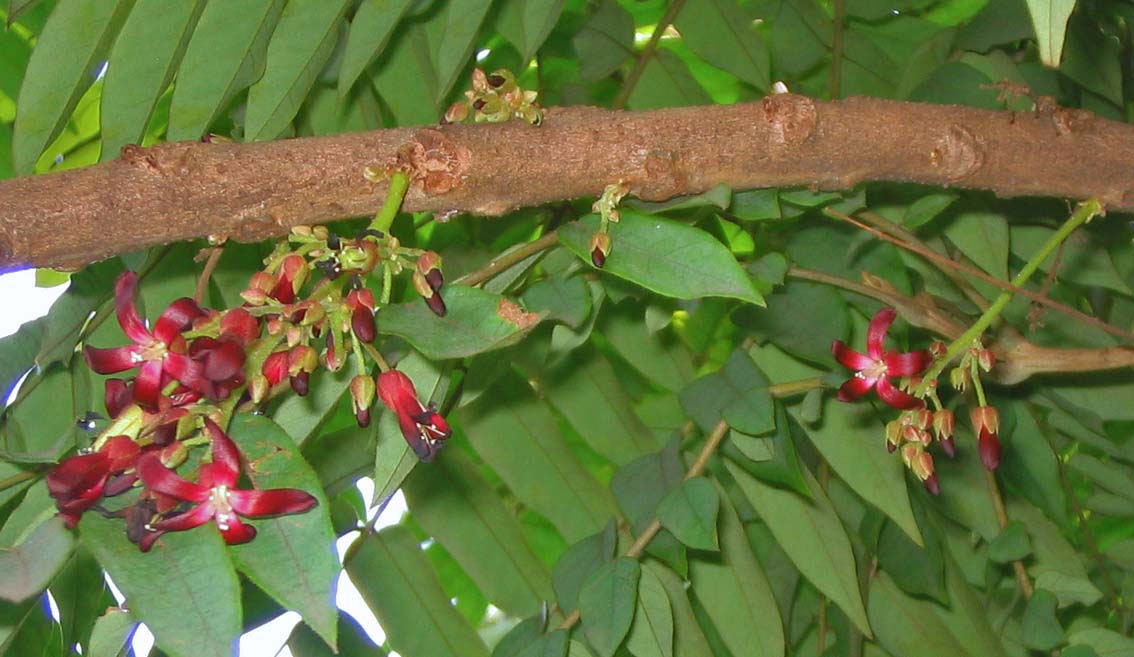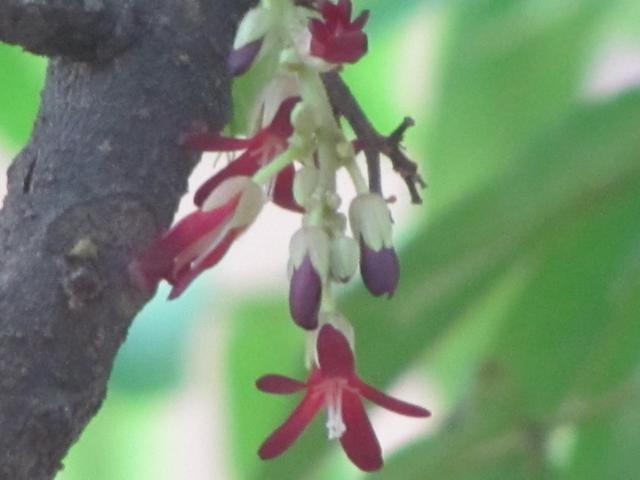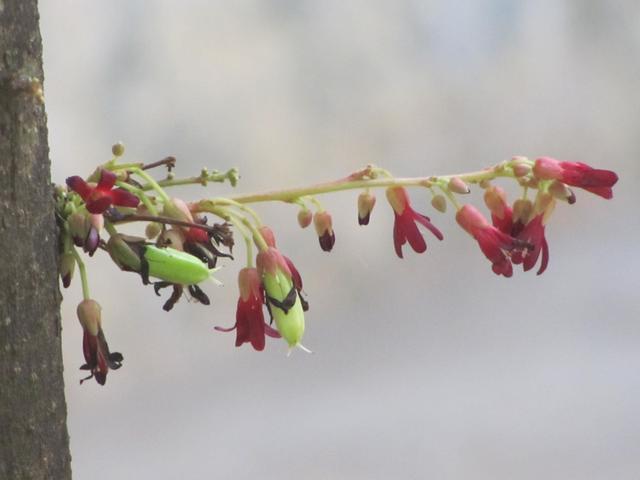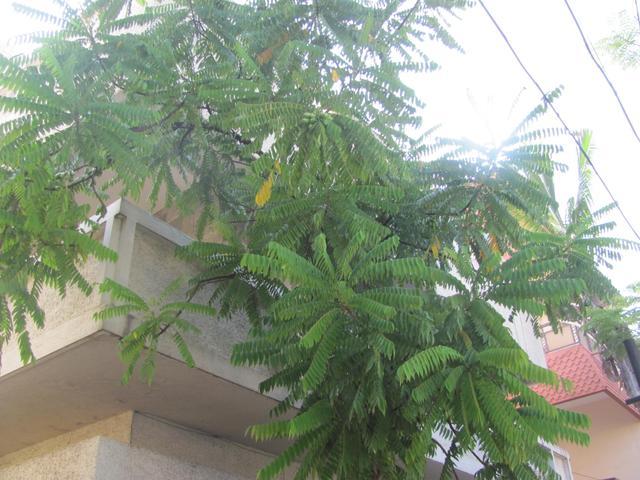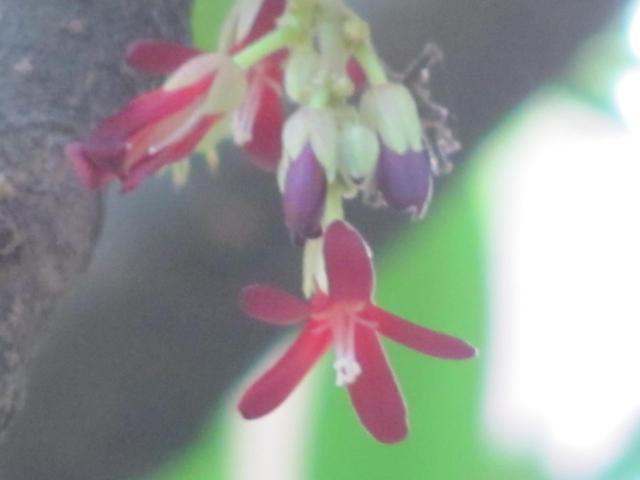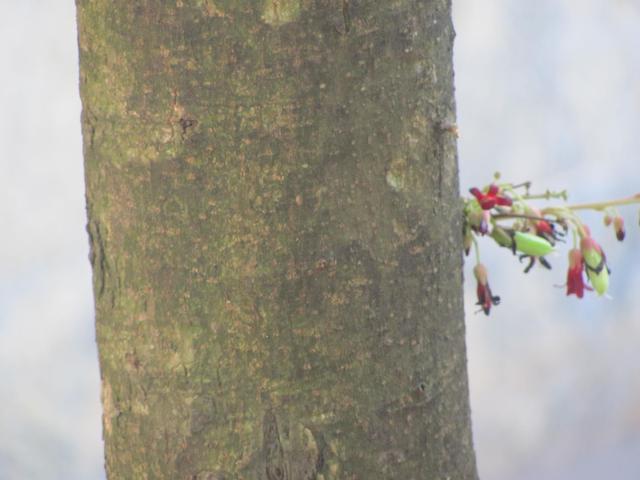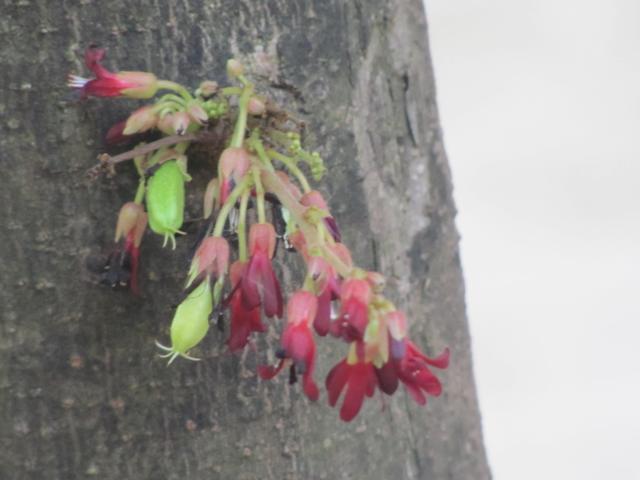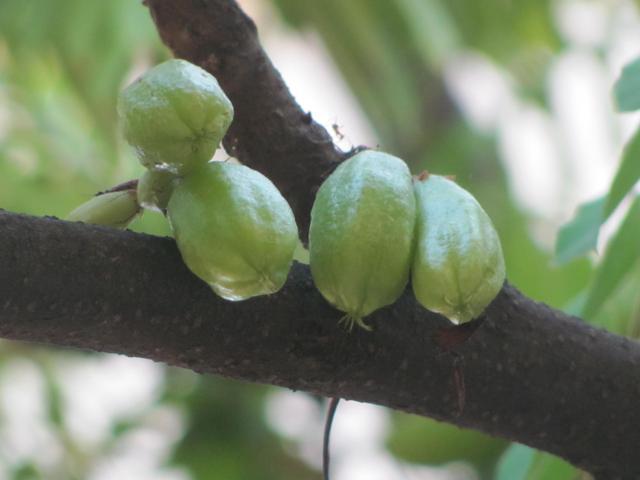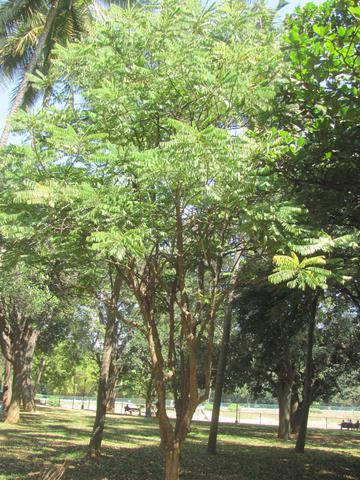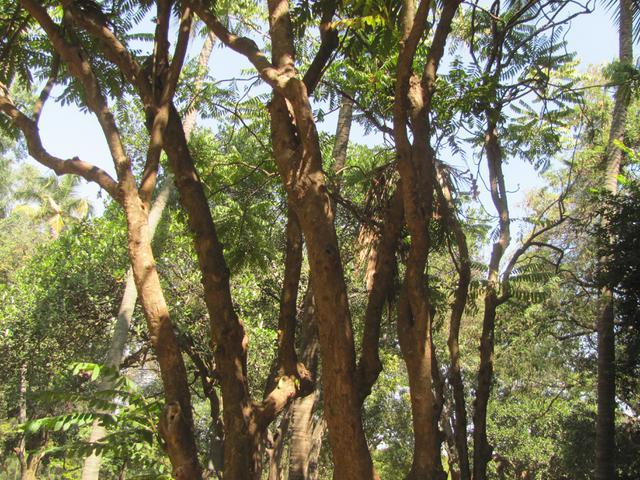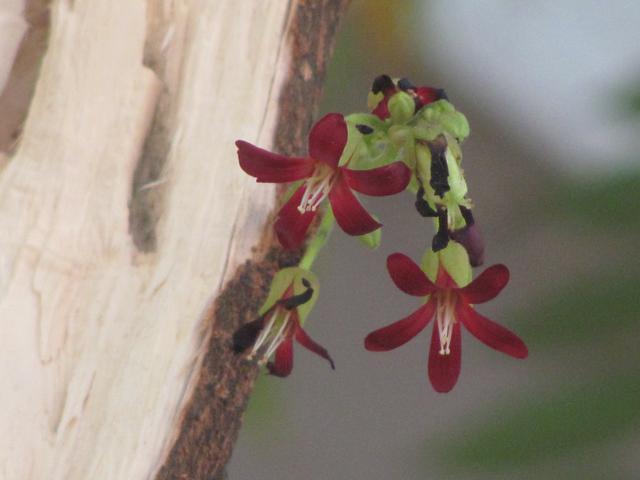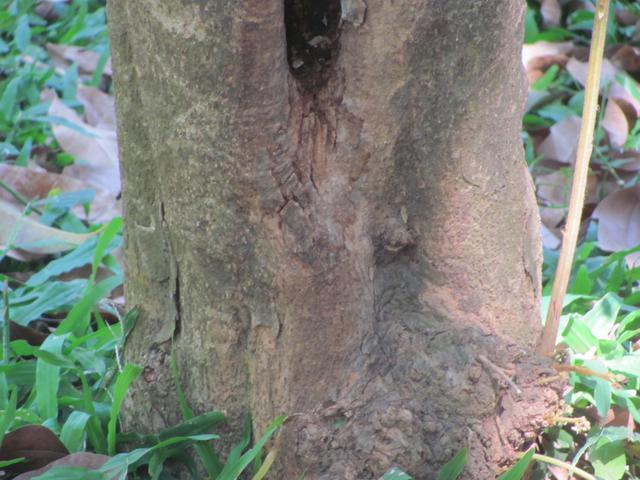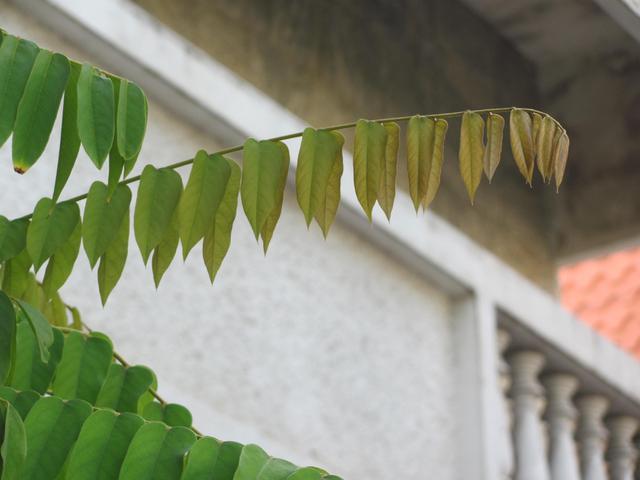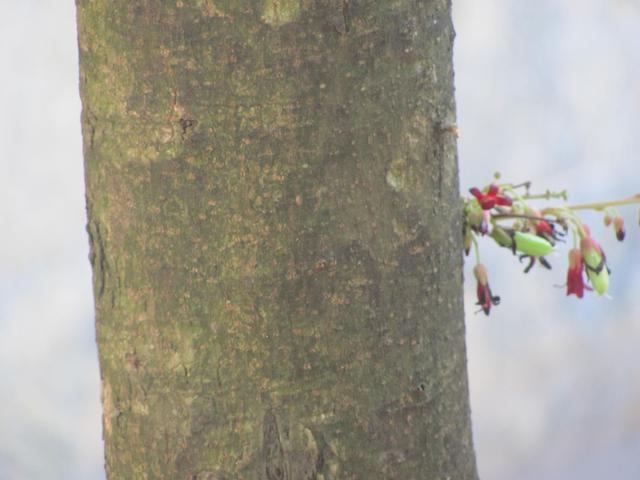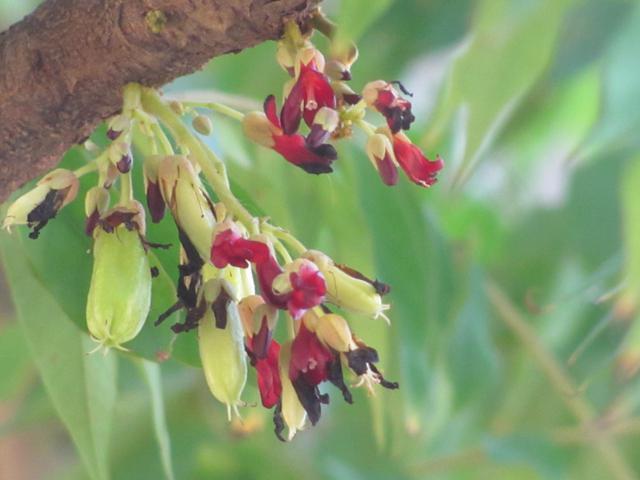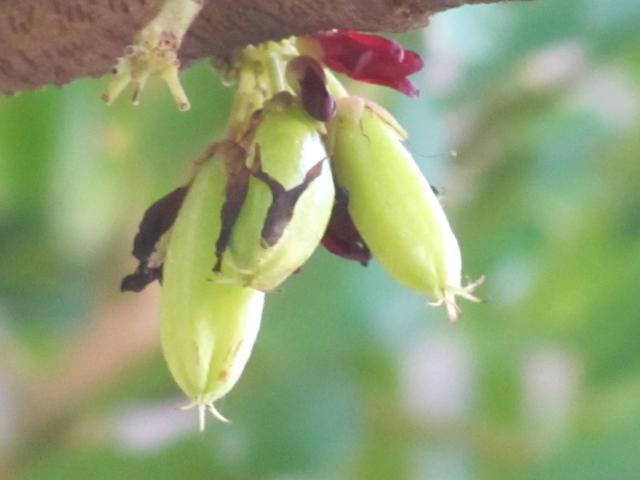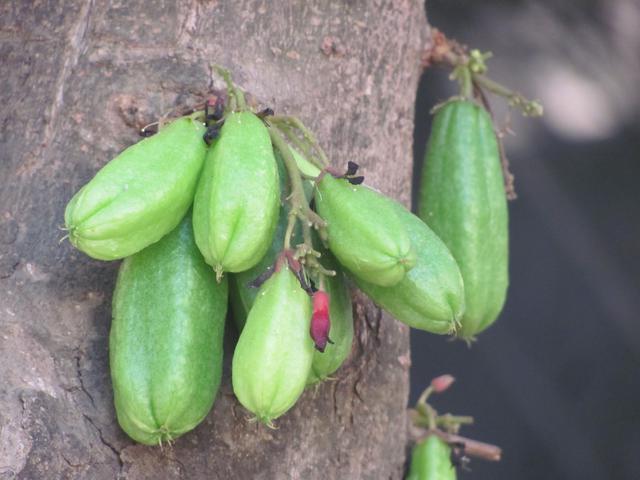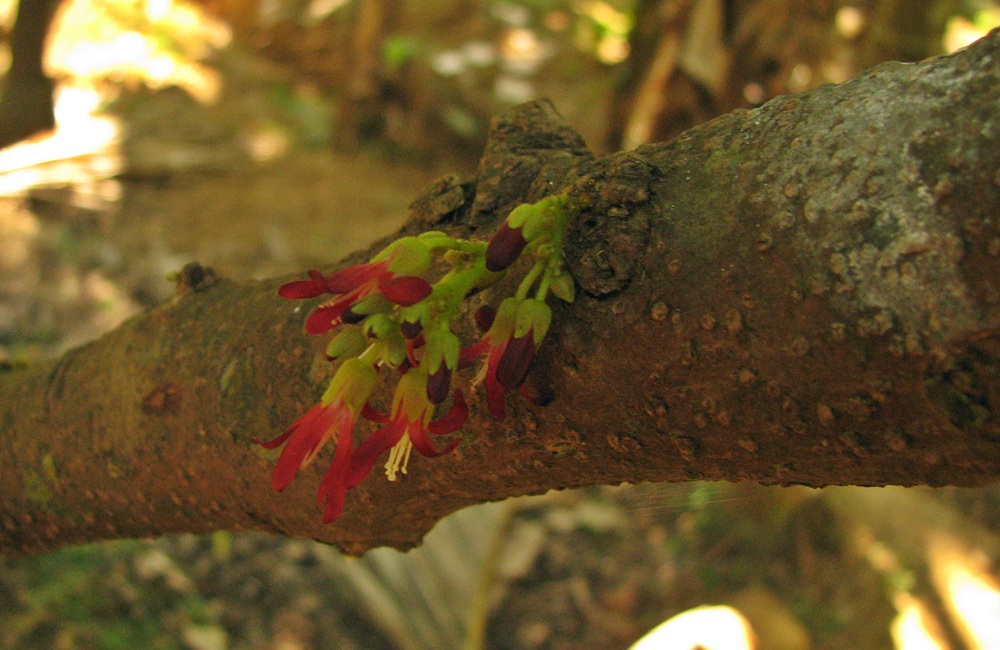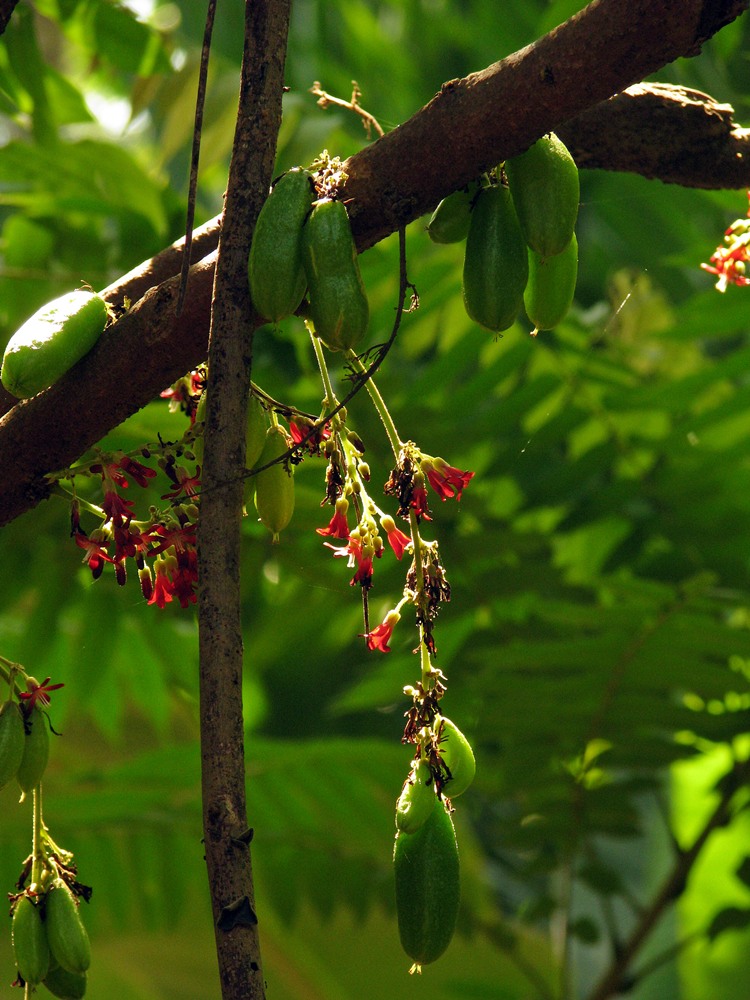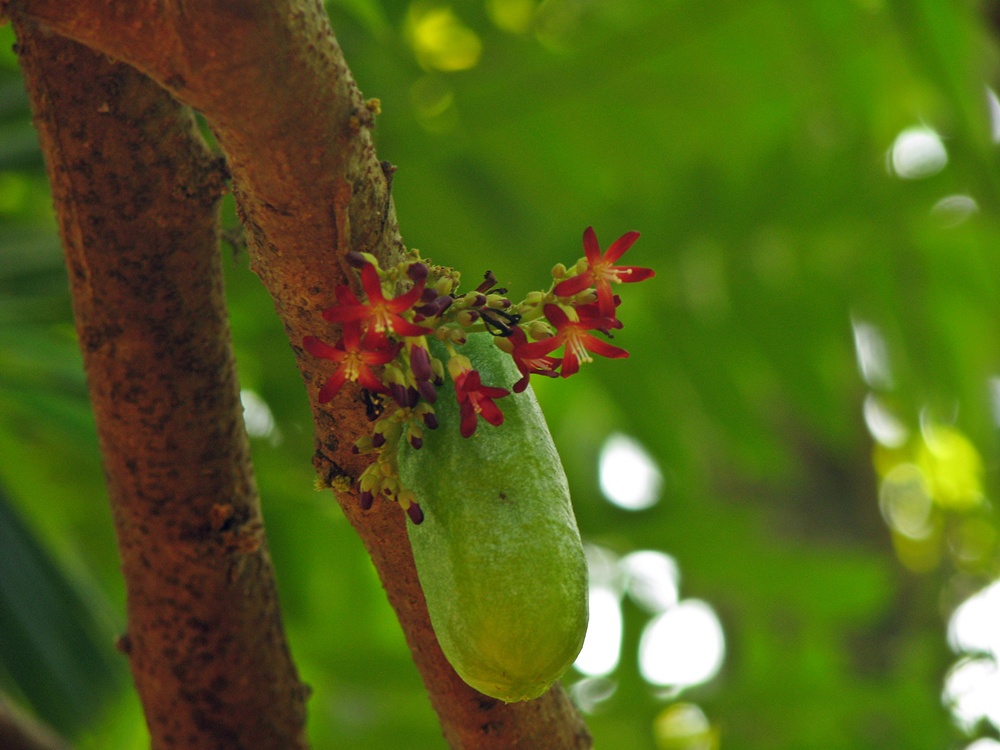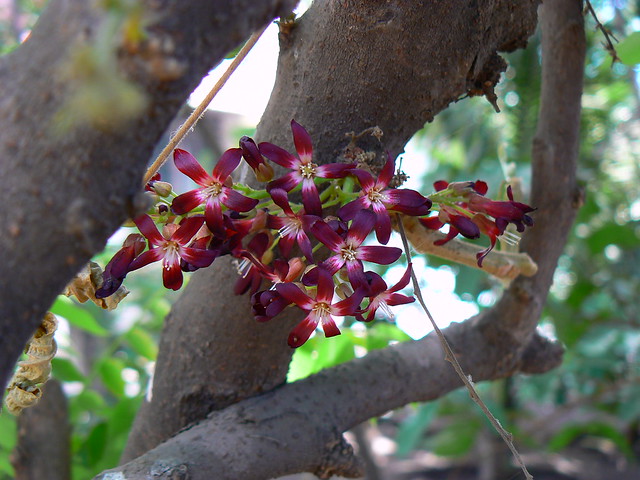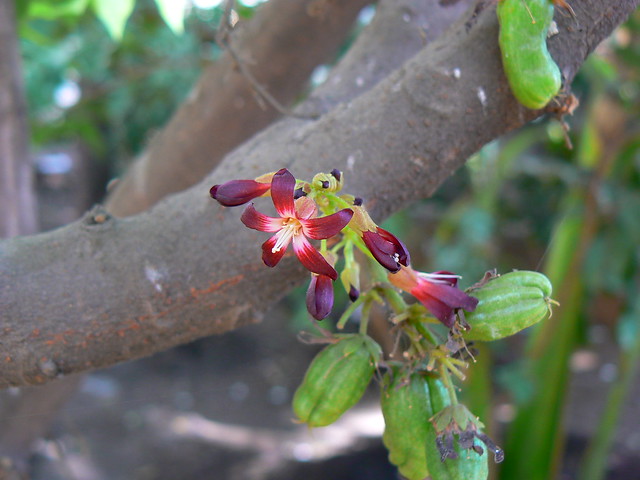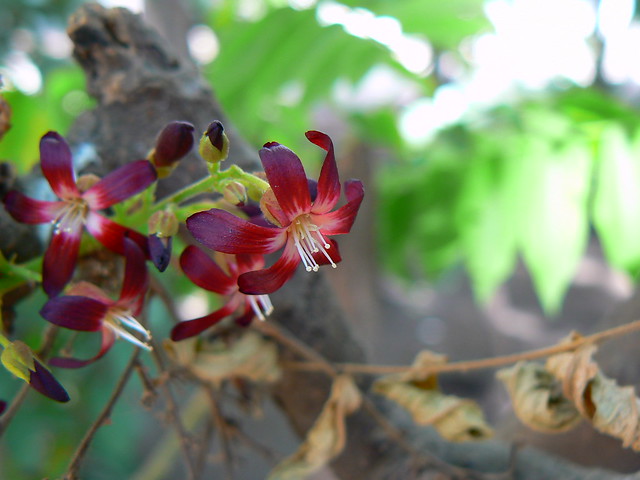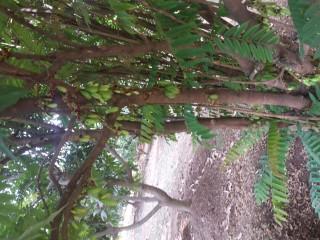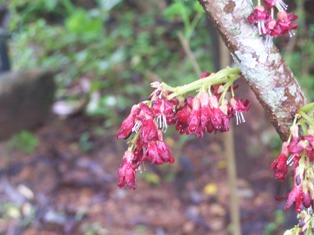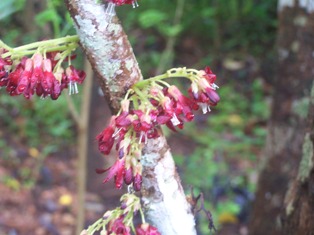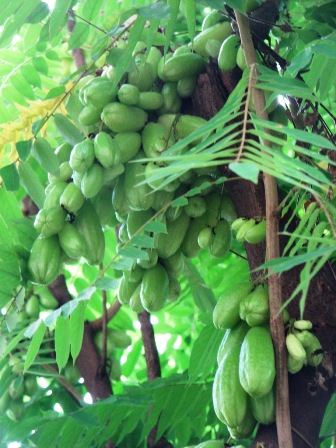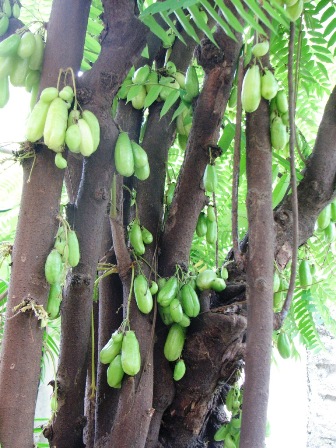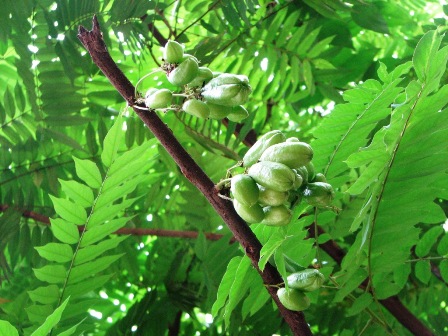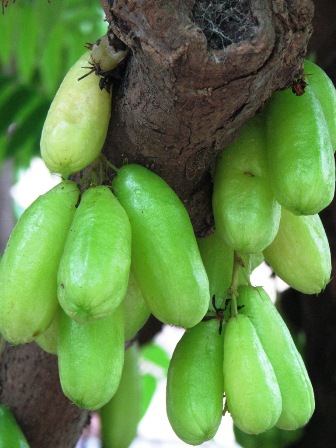|
Averrhoa bilimbi L., Sp. Pl. 428 1753. (Syn: Averrhoa abtusangulata Stokes; Averrhoa obtusangula Stokes);
.
av-er-OH-uh — named for Averrhoes, an Arabian physician … Dave’s Botanary bil-LIM-bee — Latinized form of the aboriginal name … Dave’s Botanary . commonly known as: bilimbi, cucumber-gooseberry, cucumber tree, tree sorrel • Hindi: बिलिम्बी bilimbi • Kannada: ಬಿಳಿಂಬಿ bilimbi • Konkani: बिम्बुल bimbul • Malayalam: ചിലുംബ പുളി cilumba-puli, വിലിംബി vilimbi • Manipuri: heinajom • Marathi: बिंबला bimbala • Tamil: புளிச்சக்காய்மரம் puliccakkay-maram • Telugu: బిలించిచెట్టు bilimbi-chettu . Distribution: widely cultivated in tropics; origin unknown .
urban tree for id mm1 28092011:
tree for identification near laburnum road, gamdevi, mumbai photographed today planted by the bmc i guess flowers were about 15 mm across Averrhoa bilimbi of Oxalidaceae family. the fruits are good for making tasty pickles.
Irumpan Puli in Malayalam (may be rich in Iron (irumpu in malayalam)).
Doesn’t the leaves and the flowers are attached give the impression of cousin of Raiamala? This is Bimli [Averrhoea bilimbi]. very nice, this is new to me… on the net its fruits are described as tree cucumber, and would you know it? they do look like cucumbers, but pH of the pulp is about 4.47..oxalic acid content… makes for interesting chutney etc… AND these red flowers are in striking contrast to pink flowers of another Avorrhoea we are all familiar with: the star fruit.. a. carambaola.
ONE CAUTION: lectin of carambaola / starfruit makes it a no no for Blood group B folk.
Do not have any info on lectins of this A. bilimbi… have not dug far enough in literature today…
Averhhoa bilimbi. This is Avorrhoea bilimbi. Fruit Trees of Bangalore – RA – Averrhoa Bilimbi – Cucumber Tree – Bilimbi: (11 pictures)
The bilimbi tree is long-lived, reaches 5-10 m in height. Its trunk is short and quickly divides up into ramifications. Bilimbi leaves, 30-60 cm long, are alternate, imparipirmate and cluster at branch extremities. There are around 11 to 37 alternate or subopposite oblong leaflets.
This Carambola relative produces very small pickle-like fruits which are borne directly on the trunk of the tree and also on the branches. The fruits are preceded by small red flowers on the trunk and branches. Its flowers, like its fruits, are found in hairy panicles that directly emerge from the trunk as well as from the oldest, most solid branches. The yellowish or purplish flowers are tiny, fragrant and have 5 petals. The bilimbi fruit’s form ranges from ellipsoid to almost cylindrical. Its length is 4-10 cm. The bilimbi is 5-sided, but in a less marked way than the carambola. If unripe, it is bright green and crispy. It turns yellowish as it ripens. The flesh is juicy, green and extremely acidic. The fruit’s skin is glossy and very thin.
The bilimbi is too acid for eating raw but the green uncooked fruits are prepared as a relish in Suriname.
Originated seemingly from the Moluccas, in India, where it is usually found in gardens, the bilimbi has gone wild in the warmest regions of the country.
Ref. Flowersofindia you have shown really beautiful uploads of many trees today. Thanks for these nice treat to eyes
The bilimbi tree is long-lived, reaches 5-10 m in height. Its trunk is short and quickly divides up into ramifications.
Bilimbi leaves, 30-60 cm long, are alternate, imparipirmate and cluster at branch extremities. There are around 11 to 37 alternate or subopposite oblong leaflets.
This Carambola relative produces very small pickle-like fruits which are borne directly on the trunk of the tree and also on the branches. The fruits are preceded by small red flowers on the trunk and branches.
Its flowers, like its fruits, are found in hairy panicles that directly emerge from the trunk as well as from the oldest, most solid branches. The yellowish or purplish flowers are tiny, fragrant and have 5 petals.
The bilimbi fruit’s form ranges from ellipsoid to almost cylindrical. Its length is 4-10 cm. The bilimbi is 5-sided, but in a less marked way than the carambola. If unripe, it is bright green and crispy. It turns yellowish as it ripens. The flesh is juicy, green and extremely acidic. The fruit’s skin is glossy and very thin.
The bilimbi is too acid for eating raw but the green uncooked fruits are prepared as a relish in Suriname.
Originated seemingly from the Moluccas, in India, where it is usually found in gardens, the bilimbi has gone wild in the warmest regions of the country.
Attachments:
Cucumber Tree – Bark Young.jpg
Cucumber Tree – Bark.jpg
Cucumber Tree – Branch.jpg
Cucumber Tree – Canopy.jpg
Cucumber Tree – Flower.jpg
Cucumber Tree – Fruit New.jpg
Cucumber Tree – Fruit Tender.jpg
Cucumber Tree – Fruit.jpg
Cucumber Tree – Leaf Tender.jpg
Cucumber Tree – Leaf.jpg
Lovely set of pictures Balsaminaceae, Geraniaceae and Oxalidaceae Week: Oxalidaceae :: Averrhoa bilimbi at North Karnataka- PKA2 : 4 images. 8 posts by 6 authors.
Bot. name: Averrhoa bilimbi
Family: Oxalidaceae Location: North Karnataka Plant Habit: Tree (almost 8m tall) Habitat: cultivated In Malayalam it is called Ilumbipuli, good for Sardine dishes!!! Nice sharing … we do not have this here.. (Panipat) Many thanks for this upload dear Prashant — it reminded me of this Oxalidaceae member!
… ഇലുമ്ബി പുളി is it correctly typed ? for the name you gave – Ilumbipuli.
Balsaminaceae, Geraniaceae and Oxalidaceae Week :: DV30 :: 22 AUG 07 14:31 :: Oxalidaceae » Averrhoa bilimbi in Thane : 3 images. 6 posts by 5 authors. av-er-OH-uh — named for Averrhoes, an Arabian physician … Dave’s Botanary
bil-LIM-bee — Latinized form of the aboriginal name … Dave’s Botanary commonly known as: bilimbi, cucumber-gooseberry, cucumber tree, tree sorrel • Hindi: बिलिम्बी bilimbi • Kannada: ಬಿಳಿಂಬಿ bilimbi • Konkani: बिम्बुल bimbul • Malayalam: ചിലുംബ പുളി cilumba-puli, വിലിംബി vilimbi • Manipuri: heinajom • Marathi: बिंबला bimbala • Tamil: புளிச்சக்காய்மரம் puliccakkay-maram • Telugu: బిలించిచెట్టు bilimbi-chettu Distribution: widely cultivated in tropics; origin unknown References: Flowers of India • Top Tropicals • Dave’s Garden • Wikipedia • NPGS / GRIN • Further Flowers of Sahyadri by Shrikant Ingalhalikar in garden of residential premise, Thane on 22 AUG 07 How could you always manage to post such wonderful photographs …? No words I have viewing today’s posts!! These fruits are very sour and are used to make “dal” soury. Averrhoa bilimbi family : Oxalidaceae Thank you … for identifying specimen photos.
. Averrhoa bilimbli ?: Thanks a lot, …, for pointing it out.
. References:
|
Disclaimer
1. For any mistake in identification or for becoming efloraofindia e-group member (for contributing towards building of efloraofindia or otherwise), pl. mail to indiantreepix@googlegroups.com or itpmods@googlegroups.com
2. For better viewing of species’ pages, colour scheme & formatting is being followed as: Description of the species, Details of other flora species on the same page, Uses/ harms, Distribution, Abundance/ Location/ Flowering time & date, Habit & habitat, Etymology & pronunciation, Other interesting information, stories etc., Others, Botanical names, Common names, Main point of discussion below, Discussion about Botanical names.
Navigation
- Award for eFloraofIndia
- Colour scheme & formatting
- Copyrights, Permissions, Citations
- eFloraofIndia appreciated
- Names of Plants in India site
- Flowersofindia site
- Posting Guidelines
- For members’ information
- Logo, Tagline, Acronym
- Volunteers required
- ‘Pitamah’ of eFloraofIndia
- ‘अजेय’ ‘Ajey’ of eFloraofIndia
- ‘Saarthi’ ‘सारथि’ of eFloraofIndia
- ‘Jewel’ of eFloraofIndia
- ‘Grassman’ of eFloraofIndia

